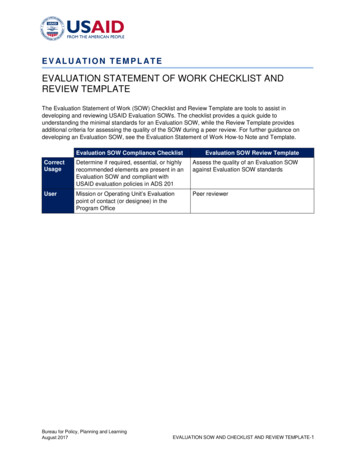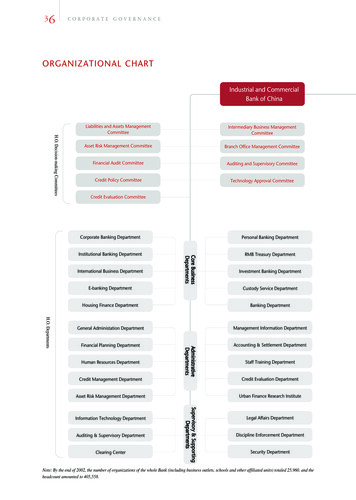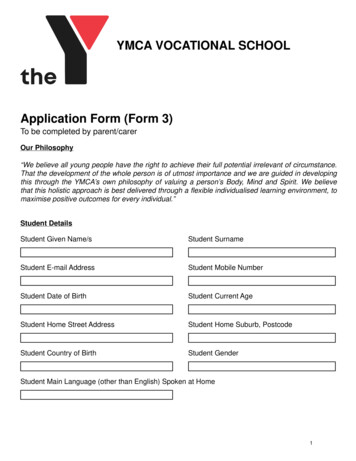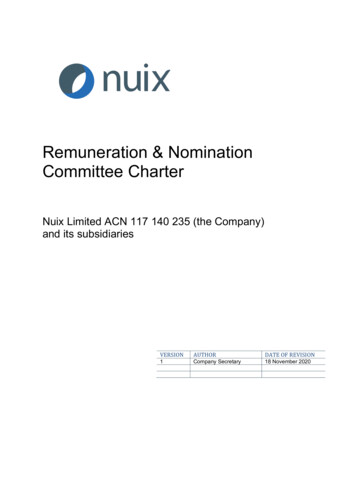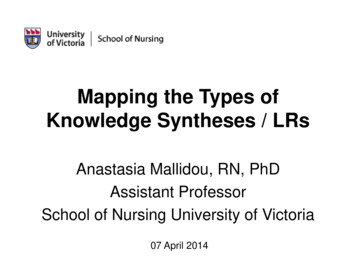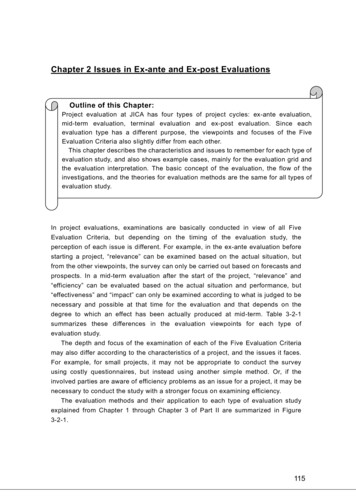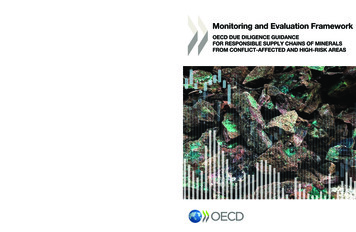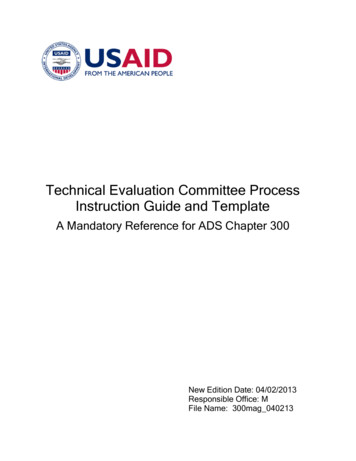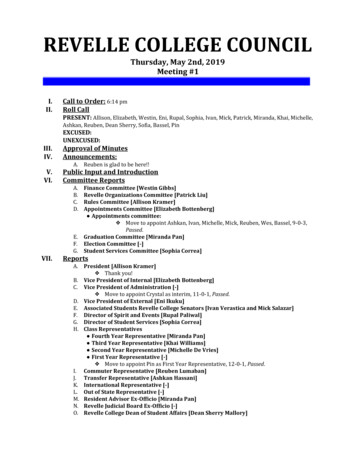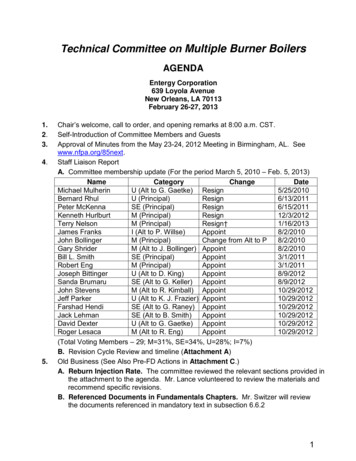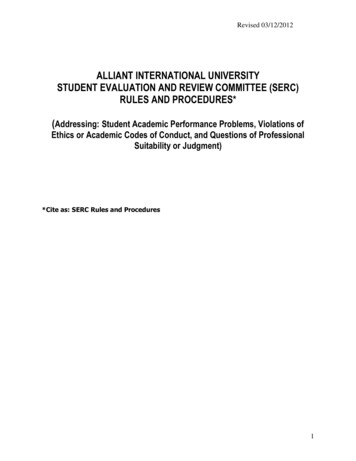
Transcription
Revised 03/12/2012ALLIANT INTERNATIONAL UNIVERSITYSTUDENT EVALUATION AND REVIEW COMMITTEE (SERC)RULES AND PROCEDURES*(Addressing: Student Academic Performance Problems, Violations ofEthics or Academic Codes of Conduct, and Questions of ProfessionalSuitability or Judgment)*Cite as: SERC Rules and Procedures1
Revised 03/12/2012I.OverviewThe goal of the Student Evaluation Review Committee (hereinafter “SERC” or “Committee”)process is to uphold academic and professional standards, program standards, and Universitypolicies and procedures regarding student evaluation. The Committee will guide studentstoward successful completion of their program and assist with remediation of difficultiesbrought to the attention of the Committee. Successful program completion requires that allstudents meet academic standards and standards of professional competence, conduct, ethics,and demeanor required by their program of study.The SERC process is utilized when concerns are raised about a student’s academic sufficiency,fieldwork suitability, viability of professional judgment, or ethical or appropriate conduct in theacademic learning environment. Difficulties in personal adjustment/appropriate behaviormanifested outside of courses or field placement/internship are potentially relevant to astudent’s professional development and are also of interest to this Committee, though formalreview of such cases may, depending on the specific circumstances, rest with the Non-AcademicCode of Conduct Committee.The SERC is a program-based committee aligned with the relevant accreditation and/oradministration of the program and as such serves as a recommending body to the ProgramDirector or equivalent, who makes the final decision. After meeting with a student, a SERC’srecommendations about appropriate action can include: No Action Required, Remediation Plan,Warning, Probation, Mandatory Leave of Absence, Suspension or Termination.II.General Committee TasksSERC is responsible for review of and recommendations on referrals concerning problematicissues arising from/under:A.B.C.D.III.Student’s Academic Performance and ProgressStudent’s Professional Suitability/JudgmentStudent’s Ethical BehaviorAcademic Code of ConductStructure of the Student Evaluation and Review Committee (SERC)A.Membership (Composition and Responsibilities)1.Composition1 - The Committee is comprised of the following members(with voting rights unless otherwise indicated) who are appointed to theCommittee by the Program Director or equivalent (with consultation asappropriate): Core Faculty members (recommended minimum 3, including Chair)Student Services Representative (non-voting member)1The Program Director, at his/her option, may request the presence of the ProgramCoordinator in Committee meetings for administrative assistance.2
Revised 03/12/2012 Fieldwork/Internship Representative, where relevant (non-voting ifnot Alliant faculty or equivalent status);Student Disability Coordinator, invited when student is registered withStudent Disability Office, student accommodation is an issue, orotherwise, at request of the Program Director or equivalent (nonvoting member)Designated Official for International Students, invited when student isan international student (non-voting member)Bias-related Committee Representative, invited when a student hasbeen accused of committing a bias-related incident (non-votingmember)2.Responsibilities of the Chaira)Develops a meeting schedule after consulting with all membersand assures the completion of the tasks of the Committee for thesemester;b)Conducts meetings in a professional and orderly manner;c)Is knowledgeable about University and program policies and therelevant codes of ethics and their relationship to the issues beingdiscussed;d)Ensures that all necessary material (i.e., student files) andpersonnel are available at each meeting;e)Assumes or delegates responsibility for the preparation and properdissemination and storage of all written and verbalcorrespondence from the Committee, including, but not limited to,letters to the Program Director or equivalent, memos, etc.;f)Tracks remediation plans and status of students in the process ofremediation by the Committee;g)Serves as spokesperson for the Committee to the Program and tothe School;h)In coordination with the Program Director or equivalent, confersand corresponds with University legal representatives whennecessary;i)Strategizes and plans the progression of the Committee in orderto assure successful completion of its tasks each semester;j)Addresses with the Program Director or equivalent issues ofproblematic performance by SERC members, including problemsof attendance or behavior during the SERC or its deliberations;k)Regularly communicates with Program faculty on issues related tothe Committee’s manner of operating and on issues related toprevention and remediation of the types of issues coming beforethe SERC; andl)Assures a proper succession to the next Committee Chair of casesnot resolved during the term of the Chair with clearcommunications to affected students about the transition andstatus of any pending cases.3.Responsibilities of Members of the Committee3
Revised 03/12/2012a)b)c)d)e)B.To attend all meetings.To carefully and thoroughly read the student file and any materialthe student has submitted to SERC and be prepared to discuss itwith the SERC and the student.To understand and follow all University and School policies andprocedures regarding SERC-related activities and responsibilities.To participate fully in each meeting, using impartial and unbiasedjudgment.To recuse her/himself from participation as a Committee memberin cases in which the Chair determines that s/he has a conflict-ofinterest, or in cases in which s/he cannot evaluate the case fairlyand impartially (this does not preclude the same Committeemember from providing information relevant to that case).Examples of conflict of interest include, though are not limited to,the faculty member who referred the student to SERC.Term of Appointment of SERC ChairThe relevant Program Director or equivalent appoints the Committee Chair annually, andit is recommended that no one person serve as SERC Chair for a term longer than three(3) consecutive years.C.SERC Business RulesAs a general rule, Committee meetings require the presence of all members (or theiralternates, where applicable) appointed by the Program Director or equivalent to thecase. (In unusual circumstances, a simple majority of the voting and non-votingmembers shall constitute a quorum for purposes of allowing a meeting to proceed.)In cases in which a Committee member has recused her/himself from serving (inaccordance with Section III (A) above), the Program Director or equivalent will appointan alternate faculty member from the Program to serve in her/his stead.Committee recommendations will be by means of majority vote.D.Frequency of SERC MeetingsThe SERC will meet on an “as needed” basis with sufficient regularity to assure that allstudent referrals are reviewed and acted on in a timely manner and that its other dutiesare discharged in a timely fashion. As a general rule, meetings will occur during periodswhen faculty members are on contract. Emergency meetings on an ad-hoc basis,however, may be called outside of these periods, where absolutely necessary, torespond to urgent deadlines in extraordinary cases.4
Revised 03/12/2012IV.Status of the CommitteeA.Nature of the ProceedingsSERC meetings are academic rather than legal proceedings. The presence of legalcounsel and representation of any party therefore is not appropriate and is notpermitted.B.ConfidentialityAll SERC proceedings and related communications are governed by theconfidentiality/privacy provisions of FERPA (Family Educational Rights and Privacy Act).Discussions, deliberations, decisions, and recommendations may not be shared withpeople outside of the Committee, other than for a legitimate educational purposeconsistent with FERPA.C.SERC AuthoritySERC serves as an advisory body to the Program Director or equivalent, makingrecommendations for decision.V.Bases for Referral to SERCThe Committee considers a broad range of student problems, including, but not limited to,insufficient academic performance and/or progress, lack of suitability for the profession,unethical or inappropriate behavior in courses or field placements/internships, and reportedviolations of the Academic Code of Conduct.The following constitute areas of student difficulty:A.Insufficient Academic Performance or Progress: Probation Status resultsautomatically from receipt of the following:1.For undergraduate students, a GPA below 2.02.For graduate students, a GPA below 3.0B.Depending on the program, a student’s academic standing may be jeopardizedby one or more of the following:1.Receipt of one or more grades of C, D, F, No Credit/Fail, MarginalPass/Some Concerns2.Receipt of one or more Incomplete grades3.Insufficient progress on dissertation/doctoral project4.Failure of comprehensive or competency examination5.Failure to meet academic program standardsC.Professional Practice Field Training Unsuitability (at Graduate Level)Fieldwork unsuitability refers to a student’s behavior and/or decision-making thatis unsuitable and/or inappropriate or unprofessional for practice in the field5
Revised 03/12/2012setting, as established by the profession. Concerns in the area of suitability forthe profession include, though are not limited to, lack of development ofprofessional skills within a field context; expressions of personal issues in waysthat are inappropriate to the setting; lack of sensitivity to the perspectives ofpeople from other cultures, religions, sexual orientation identity status, disabilitystatus and gender.D.Unethical and/or Inappropriate BehaviorThe University requires that all students adhere to the relevant principles ofapplicable professional and/or licensing body(ies) (e.g., professional associationcodes of ethics and the ethical requirements of professional licensing andcertification boards relevant to the profession in which the student aspires tomembership). Students are expected to conduct themselves in academic andprofessional settings, including field training/internship and research sites, in amanner consistent with the profession’s expectations. Professional conductincludes respect for all University community members (including students,administrators, staff, faculty, supervisors), as well as for all clients and personnelat training sites.E.Academic Code of Conduct Violations and InfractionsViolations1.Examination Behavior: Any intentional giving or use of external assistanceduring an examination without the express permission of the facultymember giving the examination.2.Fabrication: Any falsification or invention of data, citation, or otherauthority in an academic activity.3.Plagiarism: Any passing off of another’s ideas, words, or work as one’sown.4.Unauthorized Collaboration: Collaboration in any academic exerciseunless the faculty member has stated that such collaboration ispermitted.5.Previously Submitted Work: Presenting work prepared for and submittedto another course.6.Unauthorized Research: Failure to obtain approval of the InstitutionalReview Board for research involving human subjects.7.Alteration or Misuse of Academic Documents: Any alteration or misuse ofacademic documents, including acts of forgery and/or furnishing falseinformation.8.Disruption of Academic Activity: Disruptive behavior, willful disobedience,profanity or vulgarity in a learning environment not limited to theclassroom, practicum and internship sites.9.Violations Defined by Faculty Member: Any other intentional violation ofrules or policies established by a course faculty member/academicsupervisor.10.Assisting other Students in Acts of Academic Misconduct.6
Revised 03/12/2012(Note: Under certain exceptional circumstances involving serious violation listedabove which pose a threat to the health and safety of the University community,disciplinary procedures administered by the campus senior administration mayreplace the procedures outlined below. These include circumstances in which amatter has been referred by the Program Director (or equivalent) or Dean. In thecase of a violent act, the faculty member or administrator immediately contactsthe appropriate individual as listed in the University Violence Prevention Policy asstated in the Employee Handbook, Faculty Handbook and undergraduate orgraduate Student Handbook.)InfractionsThe following acts are examples of infractions. Students found to havecommitted these acts are subject to sanctions described, as applicable, forinfractions in the Sanctions section.1.Any unintentional act that, if it were intentional, would be a seriousviolation.2.Any serious violation of the rules or policies established for a course oracademic exercise.(Note: Repeated infractions may be considered for treatment as seriousviolations.)VI.Process of SERC Referrals and Procedures Governing the SERC ProcessStudents are referred to SERC through the following processes2:1.In cases where students have been placed on “automatic” Probationconsistent with the provisions of Section V (A) of this policy, theRegistrar’s Office will promptly forward the names of those students tothe relevant Program Director or equivalent, who will then forward the listto the relevant SERC Chair for scheduling a meeting with the student fordetermination of an appropriate remediation plan.2.In other instances of suspected insufficiency of academic performanceand/or progress under Section V (A), and instances of suspectedprofessional practice field training unsuitability under Section V (B),referrals shall come from the concerned faculty member, field supervisor,or field training committee or office to the relevant Program Director orequivalent. S/he, in turn will review and assess each referral for contentand level of seriousness to determine whether or not the matter will needto be directed to the SERC for evaluation.3.Instances of suspected student difficulty falling under Sections V (C) or(D) may be referred to the relevant Program Director or equivalent byany concerned member of the community. These referrals shall undergothe same process of assessment and action as set out in subsection VI(A)(2), above.A.2In cases involving students enrolled in dual degree programs, Program Directors(or equivalent) from both schools will consult and make determinations about SERCreferral and/or process.7
Revised 03/12/20124.B.For concerns under any other area of student difficulty, a member of thecommunity may refer a concern to the relevant Program Director orequivalent. S/he, in turn, will review and assess each referral for contentand level of seriousness to determine whether or not the matter will needto be directed to the SERC for evaluation. For concerns which representa conflict of interest for the relevant Program Director or equivalent, s/heshall abstain from making the referral determination (and subsequentdecision, should the case be referred to the relevant SERC), suchdetermination/decision to be made instead by the relevant AcademicDean (or her/his designee).Process to be Used by the SERC Committee Process Following Referral1.Student NotificationThe student (and his/her faculty advisor) referred to a SERC will receivewritten, confidential notification of a SERC meeting at which the studentis to appear. The notification will be via mail (or delivery service) sent tothe student’s official address as listed in the University’s data base. Therecommended advance notice to a student to appear before a SERC is atleast five (5) business days prior to the date of the meeting. Anextension of the meeting time and date may be requested in writing bythe student within two days of receipt of the notice. The SERC reservesthe right to meet in the student’s absence and make a recommendationthat may result in decisions regarding academic status and continuationin the program.Written notification of the meeting will include the following:Time, date and place of the SERC meeting;Specific areas of student performance and/or behavior to bereviewed at the meeting;The student’s rights in the meeting (e.g., opportunity to respondto the specific areas of concerns and to present supporting writtenmaterials) and responsibilities (e.g., obligation to answerquestions and concerns of Committee members);The student’s right to be accompanied to the meeting by a nonattorney (with advance written notice);Contact information (to include address, telephone and e-mailcontact information) for the relevant SERC Chair.2.Meeting Session and Right to be AccompaniedDuring the SERC meeting about a student’s case, the Committee will askthe student to discuss the concerns, and will provide the opportunity forthe student to explain any factors that may be related to the concernsand discuss any actions that the student has already taken or plans totake to resolve the concerns. The SERC members may actively comment,ask questions, investigate and make suggestions that are intended to bebeneficial to the student. As appropriate, the Committee may also8
Revised 03/12/2012discuss with the student possible recommendations for resolution of theproblem(s).A student has the right to be accompanied to the Committee meeting byone person of her/his choice (other than legal counsel), provided theCommittee Chair receives advance written notice (24 hours or greater) ofthe person’s name and relationship to the student. An invited guestattends with the understanding that his/her role is to provide non-verbalsupport to the student. Invited guests may not participate in the meetingor provide active guidance or assistance to the student concerning theissues discussed.3.C.Further ActionIf a recommendation cannot be reached within the Committee and/oradditional action is required, the Committee members may obtainadditional information and may contact relevant resources to providemore information on the specific areas of concern (i.e., instructors, fieldtraining supervisors, administrators, staff and students). A timeline willbe established to receive and review this information so that arecommendation can be reached within a reasonable period of time.Under normal circumstances, this timeline shall not exceed 20 businessdays. In extraordinary cases, the timeline shall not exceed 40 businessdays.Sanction ConsiderationsThe Committee will consider the following factors in arriving at arecommendation as to what, if any, sanction and/or remediation plan, should beimposed:1.The degree and nature/type of academic, behavioral ethical orprofessional difficulty;2.The degree of the student’s willingness to resolve the problem;3.The student’s past history with the SERC and with any other Universitydisciplinary process;4.The student’s year in the program;5.Any other factor (particular to the student, e.g., disability status) thatSERC determines has bearing on the issue(s) before it;6.Financial ramifications of recommended action(s); and7.The impact of lack of access to University resources, including faculty, if amandatory leave is recommended.9
Revised 03/12/2012D.Recommendation and Decision Process1.Recommendations from the SERC should normally be forwarded by theCommittee Chair to the relevant Program Director or equivalent within 40business days of the date the matter was referred to the Committee.Each recommendation should clearly state:a)The reason(s) for and source of the SERC referral;b)The student’s relevant academic history and any unique relevantpersonal circumstances;c)The student’s perceived understanding of the problem(s) andresponse;d)The actions the student has taken to date to correct theproblem(s); ande)The Committee’s recommendation either that no action isrequired, or that of a particular sanction, or a remediation planshould be imposed. When a remediation plan is recommended,the Committee shall specify the recommended time-frameapplicable to the recommended remediation process including theconditions for lifting the sanction (if applicable), and anyrecommended follow-up.2.Under normal circumstances, within 10 business days of receiving therecommendation, the Program Director or equivalent will, followingcareful review and consideration of the relevant correspondence and allsupporting materials, take one of the following actions:a)Refer the matter back to the Committee for further considerationand review with appropriate explanation;b)Send a written letter to the student confirming the Committee’srecommendation(s);c)Substitute another course of action for the Committee’srecommendation(s), in which case, the Program Director orequivalent prepares and sends to SERC a written explanation andrationale for the change. A copy of the explanation will also befiled in the Program’s SERC record file, along with the originalSERC paperwork. In this instance, the Program Director orequivalent sends written notification to the student and thestudent’s advisor of the final decision without reference to theCommittee’s original recommendation;3 ORd)Send a letter to the student that incorporates some, but not all ofthe Committee’s recommendations (in which case the sameexplanatory correspondence and supporting paperworkrequirements apply as in the preceding subsection (VI) (D)(2)(c).33In these instances, the Program Director is encouraged to consult with otherappropriate colleagues prior to making the final decision (maintaining to the extentpossible the privacy of all concerned).10
Revised 03/12/2012E.Appeals ProcessA student has the right to appeal a decision of the Program Director orequivalent to the relevant Academic Dean (or alternate University official, in theevent of a conflict of interest).Appeals will only be considered when they are received in writing within ten (10)business days of the date of the decision letter. Students may not appealWarning or Probation status.Appeals may be made only on the basis that one or more of the following factorscontributed to an unfair or unsupported SERC decision: a) SERC process deviatedfrom applicable SERC policy/procedures; b) violation(s) of other Universitypolicies, rules or procedures; c) preponderance of facts not consistent with theSERC decision; d) new information not available at the time the matter wasoriginally considered by a SERC; and e) bias or discrimination in the reviewprocess.When an appeal is made, the SERC and Program Director or equivalent, at therequest of the Academic Dean (or alternate University official), will cooperatefully in presenting and discussing the recommendations and actions. The sameUniversity official decides the appropriate process for consideration of the appeal.Absent unusual circumstances, appeals processes should normally be completedwithin twenty (20) business days of receipt of the appeal. Appeals decisionsunder this section are final.VII.Feedback to Involved PartiesCorrespondence from the Program Director or equivalent to the student should be marked“Confidential” and will be mailed to the student’s official address listed in the University’s database. It should include all areas specified in Section VI (D)(1)(a-d) of this policy, and thedecision by the Program Director or equivalent. In addition, the letter should include notice ofthe student’s right to appeal the decision to the Dean, as set out in Section VI (E) above. Itshould also include the name of a person for the student to contact if s/he has questions. TheProgram Director or equivalent should normally be expected to send this letter to the studentwithin ten (10) business days of the date s/he receives the recommendation from SERC.In cases resulting in disciplinary action, a copy of the decision letter will be given routinely tothe student’s Academic Advisor and, if the matter pertains to a field training/internship issue, tothe student’s Field Training/Internship Advisor. In addition, in cases resulting in Probation,Mandatory Leave of Absence, Suspension, or Termination copies of the decision letter are alsosent to relevant administrative personnel (e.g., the campus Registrar). A copy of the decisionletter is also placed in the student’s academic file and, if pertinent, the Field Training/Internshipfile. In addition, if the decision of the Program Director or equivalent involves a faculty member(e.g., if the remediation plan requires a particular action on the part of a faculty member, achange in advisor or dissertation chair, re-enrollment in a course, etc.), then that faculty11
Revised 03/12/2012member is provided specific feedback on his/her involvement by the Program Director orequivalent; the confidentiality of the process is maintained as much as possible.VIII.Outcomes/Sanctions Under SERC ProcessA.For cases in which no student difficulty is found, no sanction or remediation willbe recommended. The case will instead be recommended for dismissal. If theProgram Director agrees on this course of action, the complaint materials will notbe made part of the student’s academic file.B.For cases referred to SERC due to low GPA (“automatic” Probation Status), theSERC will recommend to the Program Director or equivalent an appropriateremediation plan.C.For all other cases involving concerns of academic performance or progress, orconcerns related to professional practice field training suitability, or unethical orinappropriate behavior, the SERC will determine if action is required, and if so, itwill recommend one of the following actions to the Program Director orequivalent:1.WarningWarning Status, with or without a remediation plan, can berecommended by the SERC when a student’s academic work orprofessional development falls below University or program standards,but the nature of the difficulty or infraction does not require more seriousor more immediate action.2.ProbationProbationary Status is recommended when a student’s academic progressor professional development has been inconsistent with Universityrequirements. A student is given a specific amount of time (usually oneterm) in which to remediate the cause(s) of probation or will otherwiseface dismissal from the program.When a Program Director or equivalent acts to implement Warning orProbation, the SERC is usually responsible for monitoring and advising theprogression of a student in a remediation plan, where one has beenimposed. The process for monitoring students includes regular reportsfrom instructor, students and/or their advisors, reviewing student filesand, as necessary and appropriate, recalling students to the Committee.It shall be the responsibility of the SERC in such circumstances to reviewthe case and to determine whether the student has completed all of therequirements of the remediation, in which case the removal of theProbationary status will be recommended. In the event that the SERCdetermines that the conditions which resulted in Probation have not beenremediated, the SERC may recommend other action, including a)continuance of the status of Probation or b) that a more severe sanctionbe imposed. The Program Director or equivalent will review the12
Revised 03/12/2012recommendation of the SERC, make a determination as to appropriateaction and send notification of this action to the student within ten (10)business days of receipt of the recommended action.3.4.D.Mandatory Leave of AbsenceA student is recommended for Mandatory Leave of Absence in cases inwhich the academic work or professional development, in the opinion ofthe Program Director or equivalent, and taking into consideration theSERC’s recommendations, requires serious remediation that necessitatesa required leave of absence in order to complete the requiredremediation. For Mandatory Leave of Absences lasting more than 180days if the student has received federal student loans, the loans may gointo repayment 6 months from their last day of attendance. The studentmay contact their lender to receive information on deferment andforbearance options while not attending school.TerminationWhen conditions are judged to be of a serious nature and are not judgedto be remediable, when a pattern of No Credit or Marginal Pass gradesoccurs, or when a serious violation of University or School standard ofconduct and/or ethics occurs, or when a student has failed to remediatepreviously identified deficiencies within the specified time a student maybe terminated from the academic program.For cases which find infractions or serious violations under the Academic Code ofConduct, the following actions may be recommended by SERC and implementedby the Program Director or equivalent:Note: When a Program Director or equivalent acts to impose a Remediation Planunder Subsections VIII (B) or (C), above, the SERC is usually responsible formonitoring and advising the student’s progression under the plan. The processfor monitoring students includes regular reports from instructors, studentsand/or their advisors, reviewing student files and, as necessary and appropriate,recalling students to the Committee. It shall be the responsibility of the SERC insuch circumstances to review the case and to determine whether the student hascompleted all of the requirements of the remediation, in which case the removalof the Probationary status will be recommended. In the event that the SERCdetermines that the conditions which resulted in Warning or Probation statushave not been remediated, the SERC may recommend other action, includingthat a more severe sanction be imposed. The Program Director or equivalent willreview the recommendation of the SERC, make a determination as to appropriateaction and send notification of this action to the student within 10 business daysof receipt of the recommended action.1.Infractions of the Academic Code of Conducta)Warning – A letter is placed in the student’s academic fileindicating that an infraction of the Ac
A. Student's Academic Performance and Progress B. Student's Professional Suitability/Judgment C. Student's Ethical Behavior D. Academic Code of Conduct III. Structure of the Student Evaluation and Review Committee (SERC) A. Membership (Composition and Responsibilities) 1. Composition1 - The Committee is comprised of the following members
